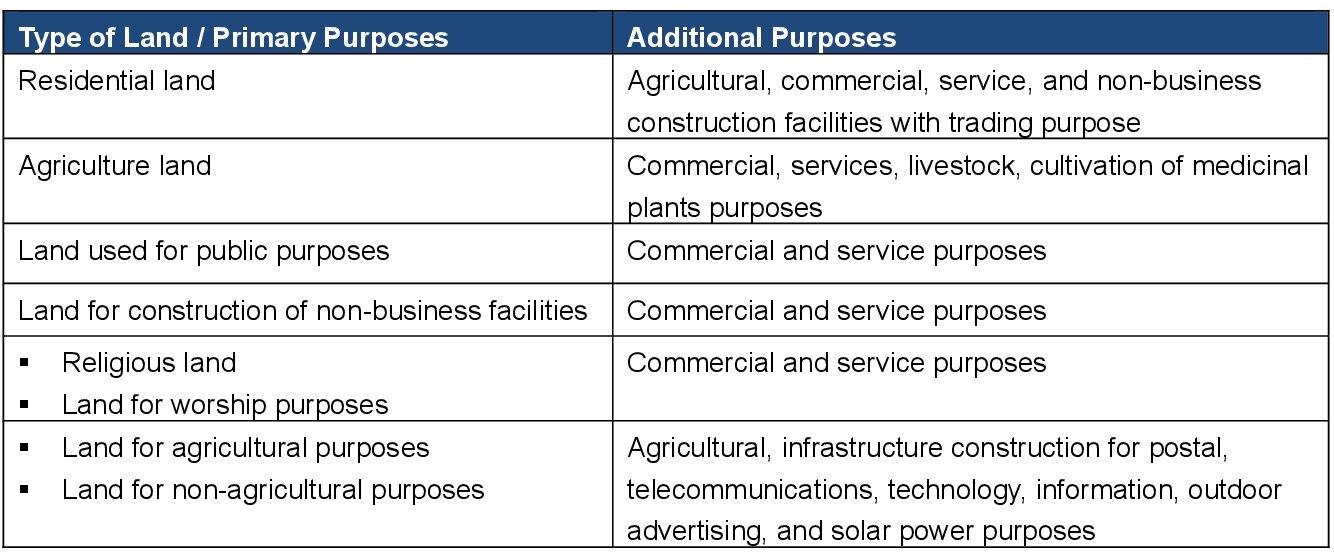
Key Takeaways
- The Land Law 2024 specifies 31 cases of land revocation for socio-economic development.
- Land valuation methods are now required to follow market principles.
- Property project developers can choose to implement projects via agreement on receiving land use rights for residential land. Holders of residential and other types of land may propose property projects, provided that such projects align with land use planning and are eligible to change land use purposes.
- The cases of land allocation and land lease via land auction are expanded.
- New regulations on multi-purpose land use in the new law.
On 18 January 2024, the National Assembly of Vietnam passed the new Law on Land No. 31/2024/QH15 (the “Land Law 2024”), which will take effect from 1 January 2025 and replace the Land Law 2013. The new law introduces significant changes enhancing the legal framework for land-related activities. Notably, these changes include a new scheme for investors to engage in project development while addressing the shortcomings of the previous laws. This article will introduce new regulations and highlight key changes regarding investors’ access to land under the Land Law 2024.
Cases of Land Revocation for Socio-economic Development
The Land Law 2013 provides cases of land revocation for socio-economic development in the national and public interests based on the classification of the decision-making bodies including (i) the National Assembly, (ii) the Prime Minister, and (iii) the Provincial People’s Committee. In contrast, the Land Law 2024 enumerates 31 specific cases of land revocation without regard to the classification as mentioned.[1] Specifically, new cases for land revocation are added in the Land Law 2024, including those related to the construction of oil and gas facilities, postal infrastructure, educational institutions, and medical facilities. These changes aim to provide a more precise and comprehensive framework for regulating land revocation cases compared to the Land Law 2013.[2]
Land Valuation Following Market Principles
The most notable change introduced by the new legislation pertains to land valuation, which is the valuation must follow the “market principle”. The new law provides four land valuation methods, including (1) comparison method, (2) income method, (3) residual method, and (4) land price adjustment coefficient method.[3] These methods inherit the provisions of Decree No. 44/2014/ND-CP guiding the Land Law 2013. In reality, the residual method is commonly used for calculating land use fees and land rent of non-agricultural real estate projects with land allocation or change of land use purposes, including urban development projects, property projects or industrial park development projects.[4]
In addition, the Land Law 2024 introduces two significant changes: (i) it eliminates the regulations on land price frames,[5] and (ii) the land price table must be developed annually, instead of every five years as stipulated by the Land Law 2013.[6] Under the previous law, the land price frames are developed by local authorities as a basis for building the land price table, which the latter is used for many purposes such as calculating land use fees for households and individuals, land use tax, etc. The land price table under the new law following market-based principles will impact the land pricing for compensations when the State recovers land from existing land users. In reality, the low land price used for calculating compensation in land revocation often results in complaints and disputes from people whose land is revoked,[7] contributing to delays in land clearance and project implementation.
Agreement on Receiving Land Use Rights for Socio-economic Development Projects
The Land Law 2024 introduces new provisions governing the implementation of socio-economic development projects through agreement on receiving land use rights in the following cases:[8]
- Projects that are not subject to land revocation (as mentioned in Section 1 above); and
- Projects without using state budget funds and are subject to land revocation, where the investor selects the form of agreement on receiving land use rights instead of proposing land revocation.
For property projects, investors can only apply agreement on receiving residential land, not other types of land (i.e. not residential land). In addition, holders of residential and other types of land may propose property projects, provided that these projects align with land use planning and are applicable for approval for a change in land use purpose.[9] These regulations ensure consistency with the Housing Law 2023,[10] where the project is approved for investment concurrently with the approval of the investor being the developer.
Regarding property projects which have no residential land but only “other types of land”, the Ministry of Natural Resources and Environment is developing a scheme to be submitted to the National Assembly for piloting the implementation of property projects via agreement on receiving land use rights or having land use rights of other types of land.[11]
Projects subjected to Bidding for Investors’ Selection
The Land Law 2024 mandates that certain projects must undergo a bidding process to select project investors. These projects include:[12]
- Projects on the construction of urban areas with mixed functions, synchronous technical and social infrastructure systems that incorporate housing; rural residential projects;
- Other projects subject to land revocation (as in Section 1) that must organize bidding under specialized laws.
For property projects, mixed residential and commercial, service projects without mixed functions, synchronization of technical and social infrastructure systems with housing (under the construction laws for new construction, renovation, and urban refurbishment), such projects are not required to undergo bidding to select investors. Instead, it may be implemented via agreement on receiving land use rights or using existing land use rights.[13]
Projects eligible for bidding to select investors under specialized laws must (i) be subject to land revocation, and (ii) not eligible for land auction or fall under cases of public assets auction.[14] Examples of such projects include waste treatment projects under the Law on Environmental Protection 2020,[15] social housing projects with two or more interested investors, etc.[16] Other projects under specialized laws are stipulated in Decree No. 23/2024/ND-CP dated 27 February 2024.[17]
New Regulations on Multi-purpose Land Use
The Land Law 2024 introduces new regulations on the use of land for multiple purposes. Under these provisions, the land use must not change its original purpose and ensure essential conditions necessary for its eventual reversion to its primary purpose.[18] For multi-purpose land use, land users are required to make a plan for multi-purpose use. This plan must be submitted to State agencies for approval.
The table below shows the land eligible for multiple purposes and its additional purposes permitted:[19]

Cases of Land Revocation, Land Lease via Land Auction
The Land Law 2013 specifies eight cases for land allocation and land lease through land auctions, including property projects, infrastructure construction projects, and others.[20] In contrast, the Land Law 2024 takes a different approach by not providing an exhaustive list the Land Law 2013. Instead, it adopts a broader approach based on exclusion criteria. Specifically, projects required for land auction under the Land Law 2024 include:[21]
- Projects using land managed by the State, not yet allocated or leased, except in cases which (i) land allocation or land lease without land auction or bidding for investor selection,[22] and (ii) land allocation or land lease via bidding for investor selection;[23]
- Allocation of residential land to individuals, except in cases where land allocation or land lease without land auction and bidding for investor selection.[24]
Additionally, the Land Law 2024 introduces a new condition for land auctions compared to the Land Law 2023. Under the new law, the land for auction must be located within the project area that has already been connected to transport infrastructure.[25]
The Land Law 2024 is set to become effective from 1 January 2025. However, in a recent development, the Vietnamese Government has proposed to the National Assembly to expedite the implementation of the law, aiming to bring it into force from 1 July 2024, six months earlier than originally planned. This proposal is still under discussion at the National Assembly and has not been adopted. In our view, once effective, the new law will provide investors and developers with greater certainty in accessing land for real estate projects.
Please stay updated with us for any new developments in Vietnam’s new land law. Should you have any questions or comments, please feel free to reach out to us.
___________________
[1] Under the Land Law 2024, the decision-making bodies for land revocation are stipulated in a sperate Article (Article 83).
[2] Resolution No. 18-NQ/TW on land use management: “More specific regulations on the competence, purpose and scope of land acquisition, specific conditions and criteria for land acquisition by the State for socio-economic development in the national and public interests”.
[3] Article 158.5, the Land Law 2024.
[4] The residual method is carried out by taking total estimated revenue minus total estimated development costs of the land calculated based on the highest effective land use (land use coefficient, construction density, maximum number of storeys of the building) according to the land use plan, detailed construction plan approved by the authority (Article 158.5(c), the Land Law 2024).
[5] Article 5.1, Decree No. 96/2019/ND-CP. Regulations on land price frames were officially issued for the first time in 1993 in Decree No. 80/CP dated 6 November 1993.
[6] Applicable from 1 January 2026 and will be adjusted from 1 January of the following year.
[7] In other words, the difference in ground rent between land value when the state compensates for land revocation and after projects’ implementation, arises from the change of land use purpose from low-value land to high-value land.
[8] Article 127, the Land Law 2024.
[9] Article 122.3(b), the Land Law 2024.
[10] Article 36.3, the Housing Law 2023, and Article 23, the Housing Law 2014 (amended and supplemented under Law No. 03/2022/QH15).
[11] Decision No. 222/QD-TTg dated 5 March 2024 of the Prime Minister on promulgating the plan for implementation of Land Law No. 31/2024/QH15.
[12] Article 126.1, the Land Law 2024.
[13] According to Report No. 729/BC-UBTVQH15 dated 17 January 2024 of the National Assembly Standing Committee on the draft Land Law (amended): “Auction of land use rights, bidding for investor selection is a form of land allocation, land lease by the State, not a criterion for determining revocation cases.”
[14] Article 5, Decree No. 23/2024/ND-CP dated 27 February 2024 guiding for implementation the Bidding Law 2023 (“Decree 23”).
[15] Articles 5, 78 and 86, the Law on Environmental Protection 2020.
[16] Article 1.4(h), Decree 23.
[17] Article 1, Decree 23.
[18] Articles 218.2(a) and (b), the Land Law 2024.
[19] Article 218, the Land Law 2024.
[20] Article 118.1, the Land Law 2013.
[21] Article 125.1, the Land Law 2024.
[22] Article 124, the Land Law 2024.
[23] Article 126, the Land Law 2024.
[24] Article 124, the Land Law 2024.
[25] Other conditions already exist in the Land Law 2013 (Article 119.1) such as: (i) Land that has been recovered and completed compensation and site clearance (i.e., clean land), (ii) Land included in annual land use plans approved for auction (with exceptions in the new law: not applicable to land managed by land fund development bodies) or implemented in practice as having a detailed plan of 1/500 for property projects.











